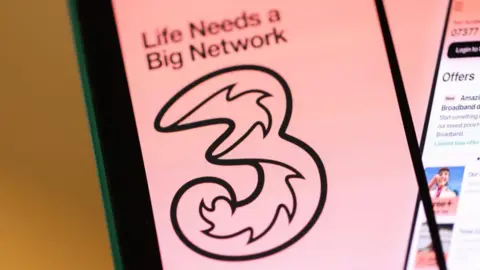On January 23, 2025, a significant service disruption affected Three, a UK mobile network provider, leaving thousands of users unable to make phone calls. This event was widely reported, with a spike of over 10,000 outage reports logged on Downdetector, a website that specializes in tracking outages across various services. Not only were Three customers impacted, but subscribers of smaller mobile brands, such as Smarty and ID Mobile, that operate on Three’s network, also faced similar communication issues.
The company promptly acknowledged the situation, issuing an apology for the resultant inconvenience. In a statement shared via X (formerly Twitter), Three confirmed that they were aware of the electrical disruptions affecting a small percentage of their voice services. The statement further assured users that the technical team was diligently working to address these issues as swiftly as possible. Despite the voice service outage, Three reassured customers that mobile data services remained functional, as well as emergency 999 calls, providing some relief amidst the chaos.
Three boasts a substantial user base of approximately 10.5 million customers within the UK. However, as the outage’s full impact is still being assessed, the exact number of affected users is uncertain. Customer support staff have informed users that while they are engaged in troubleshooting efforts, no specific timeframe for resolution had been established yet. The communication lapses have generated considerable discontent among users, with many taking to social media to express their frustrations about the disruption to their daily lives.
Reports of the fallout from the outage are varied and highlight the serious implications of losing mobile connectivity. One user stated they missed an important medical appointment due to their inability to receive calls, demonstrating how vital phone services are for timely access to health care. Another account described a parent whose child was stranded without the ability to communicate. These anecdotes reflect the broader inconvenience experienced by users, with some declaring their intent to switch to different providers as a response to the service unreliability.
This incident raises critical questions regarding compensation for customers who encountered significant disruptions in their services. According to guidance from Ofcom, the UK’s communications regulator, it may be suitable for providers to issue refunds to customers while restoration of service is underway. However, the specifics of compensation policies regarding such outages remain unclear.
Notably, the timing of this outage coincides with the regulatory clearance for Three’s intended merger with Vodafone, a former competitor, under a £16.5 billion deal. This merger, which has been in the spotlight for several months, aims to create a more competitive market landscape in the UK. However, events like the outage can impact public perception of the company and could potentially influence regulatory discussions moving forward.
Interestingly, the outage of Three’s services was not an isolated incident on this day. A prominent failure also struck the artificial intelligence tool, ChatGPT, indicating that issues with technology services were widespread. This juxtaposition of failures showcases a critical moment in the reliance on technology and telecommunications in daily life, emphasizing the importance of effective communication networks in the contemporary age.
Moving forward, it will be crucial for Three to resolve these issues expediently and to communicate transparently with their customers about the proposed remedies and any possible compensation. The resolution of this outage not only matters to the affected individuals but will also serve as an important case for how telecommunications providers manage service disruptions in an increasingly connected world.



